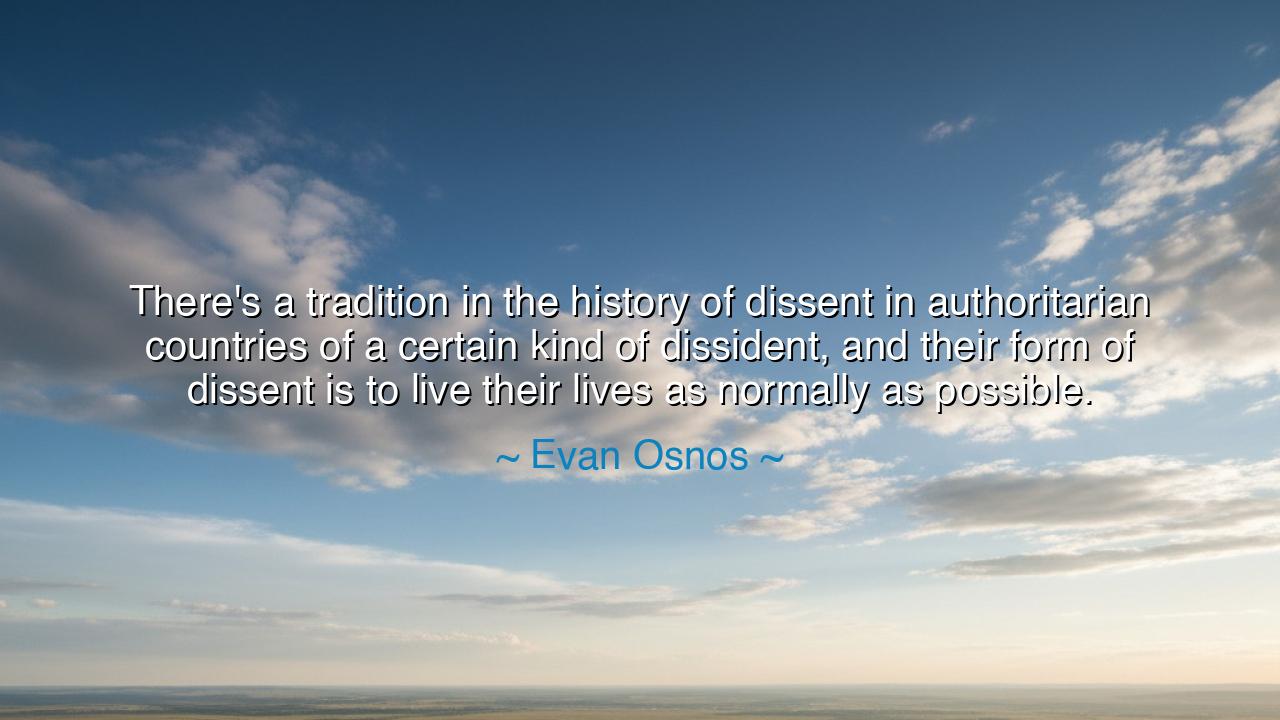
There's a tradition in the history of dissent in authoritarian
There's a tradition in the history of dissent in authoritarian countries of a certain kind of dissident, and their form of dissent is to live their lives as normally as possible.






“There’s a tradition in the history of dissent in authoritarian countries of a certain kind of dissident, and their form of dissent is to live their lives as normally as possible.” Thus spoke Evan Osnos, the keen observer of nations and souls, whose words illuminate a quiet heroism often unseen by the world. His reflection is not of the rebel with banners, nor of the orator before the crowd, but of the humble spirit who, beneath the shadow of tyranny, dares to live with dignity, normalcy, and truth. For in the realm of the unfree, even ordinary life becomes an act of defiance, and the simple choice to live honestly—to love, to speak, to create—is itself a form of revolution.
In these words, Osnos unveils a paradox that lies at the heart of resistance: that sometimes, the most radical act is not to shout, but to endure quietly; not to destroy the world, but to preserve one’s humanity within it. In the landscapes ruled by fear, where the state seeks to command not only the actions of the people but their thoughts and souls, the one who insists upon living “normally” stands as a living contradiction to oppression. To laugh sincerely, to raise children with integrity, to tell the truth in conversation—all these become dangerous, sacred acts. The dissident, then, is not only the protester on the street, but the teacher who continues to teach, the poet who continues to write, the neighbor who continues to help, even when the air itself trembles with suspicion.
History, ever the patient teacher, has shown us this truth in the lives of many. Consider the story of Vaclav Havel, the Czech playwright who later became the president of a free Czechoslovakia. During the long years of Communist rule, when every word was monitored and every mind was expected to conform, Havel and others formed what he called the “Power of the Powerless.” They did not overthrow the system with armies or slogans; they lived in truth. They refused to lie, refused to bend their lives into falsehood for the comfort of the powerful. A greengrocer who chose not to hang a political slogan in his shop window, though required by the state, was in that small act declaring his independence. “By refusing to live within a lie,” wrote Havel, “he discovers his suppressed identity.” And thus, by merely living authentically, he became a dissident.
Osnos, in his observation, draws upon this lineage of the silent resisters—those who, through the quiet rhythms of ordinary life, carve cracks in the walls of tyranny. Think of the Soviet intelligentsia who gathered secretly to read forbidden books and discuss forbidden ideas. Think of the mothers in Argentina, the Mothers of the Plaza de Mayo, who walked with photographs of their disappeared children, week after week, wordless but unstoppable. Think of the countless unnamed souls in every age who, though watched, censored, and threatened, simply continued to live according to conscience. These are the dissidents of the everyday—the ones who keep alive the memory of freedom by refusing to let it die in their hearts.
There is something deeply human—and deeply sacred—about this form of dissent. It reminds us that resistance is not only an act of confrontation, but of preservation. To live normally under oppression is to protect the human spirit from distortion. It is to insist that the tyrant may command bodies, but not souls; that he may silence speech, but not thought; that he may impose fear, but cannot erase hope. It is, in truth, a battle for the definition of normal itself—for under tyranny, the regime seeks to redefine what it means to be human. The dissident restores that definition through his life.
But there is also quiet sorrow in this kind of heroism. It is not the glory of the battlefield, but the loneliness of integrity. The one who chooses to live normally in abnormal times may find themselves isolated, misunderstood, or even punished. Yet they continue, for they understand what the ancients knew—that courage is not the absence of fear, but the refusal to let fear govern one’s soul. Their rebellion is not loud, yet it echoes across generations. Their names may be forgotten, but their influence lives in every free breath we take.
And so, dear listener, let the lesson of Evan Osnos’s words take root in your own heart. Live truthfully, even when falsehood is easier. Act justly, even when injustice is the norm. Cherish the ordinary, for it is in the ordinary that freedom truly resides. You may not stand upon a podium or lead a movement, but by living with integrity—by being kind, honest, and awake—you take your place among the quiet dissidents of history.
For tyranny, in any form, thrives on conformity; it perishes before authenticity. And so the greatest rebellion, as Osnos reminds us, may simply be to live as a free soul in an unfree world. In doing so, you affirm what no despot can destroy: the invincible dignity of the human spirit, and the eternal truth that even under oppression, life—real, ordinary, luminous life—remains an act of revolutionary grace.






AAdministratorAdministrator
Welcome, honored guests. Please leave a comment, we will respond soon